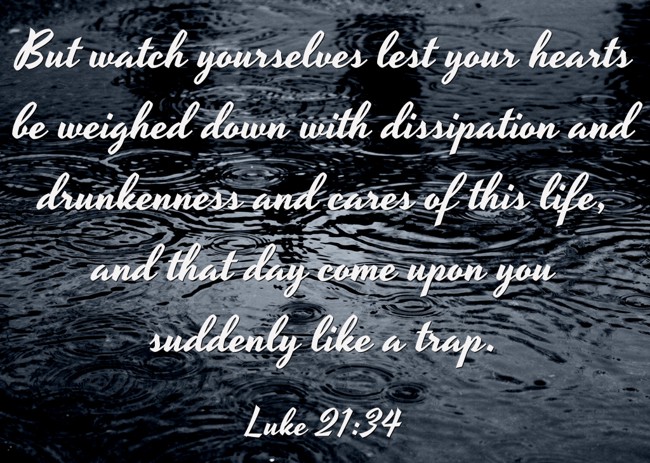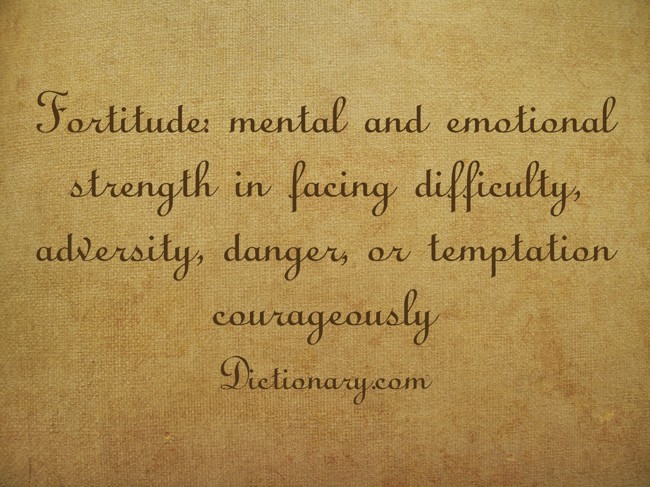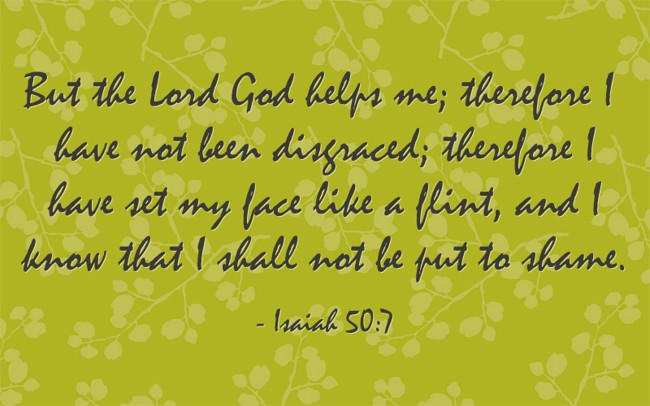
The context of Luke 21 is somewhat dry. We tend to focus on the much-debated passage of Jesus foretelling a coming day of judgment[1] or the (admittedly moralistic) point that dissipation, drunkenness, and all their little, lurid friends weigh us down. Reading on in Luke 22 recently I saw a theme I’d not noticed before. That theme is fortitude. Let’s jump right in.

Jesus warns the disciples to stay ready. The theme of fortitude starts in 21:34 and the words are rather startlingly blunt. The word is κραιπάλη, quite literally the dull headache that you get from drunkenness, or “a debauch” as Strong’s Concordance puts it. They are also to watch for drunkenness (μέθη, literally intoxication). What I find interesting is He points out these weigh our hearts down. The word for weighed down is βαρέω, to be pressed down or depressed, to be burdened. We often hear about the moral imperative to avoid debauchery and drunkenness, and it’s good for us to hear, but we seldom think of why. Jesus is intensely practical in pointing out these things are quite literally bad for us – they weigh down our hearts, often times our bodies, and make us less alert and ready to deal well with the work ahead of us.
Jesus commends his disciples for previous fortitude (22:28). At dinner in the upper room fortitude continues its subtle theme through Jesus’ last day with His disciples. It’s characteristic of a generous teacher to praise his students when they do well. But in 22:33 Peter seems to run with this praise (and react to a warning from Christ about Satan wanting to get him), and he goes too far. “Lord, I am ready to go with you both to prison and to death.” Peter declares his determination to fortitude with characteristic brashness. You can almost see Jesus’ sigh and thought of “sure, Pete,” as he foretells Peter’s imminent fall into denial of his Lord.
Jesus continues to teach his disciples fortitude. As Luke’s account moves on this is done through a couple different angles. And it makes a lot of sense if you think about it. The disciples are really going to need fortitude in the next few months when Christ is crucified. They will be scattered and terrified, but then galvanized by His resurrection to go out and start the New Testament church. In 22:35-38 Jesus pulls from an earlier experience he gave the disciples to teach them not to rely on the comfort of possessions. “ ‘When I sent you out with no moneybag or knapsack or sandals, did you lack anything?’ They said, ‘Nothing’ ” (v. 35). Contentment is a type of fortitude that allows us to avoid letting “our hearts be weighed down” by craving more stuff, and frees us up to cheerfully do the work God gives us. Not to say that getting stuff is bad. Christ goes on the next few verses to tell the disciples now is the time to get some equipment (including swords, interestingly enough) for the trying days ahead.
Jesus models an epic fortitude (v. 42-44). He agonizes in prayer on the slopes of Olivet, sweats huge drops like blood, and begs his Father God to spare him from the coming trials. The words of Hebrews 5:2 are important to remember here. The Hebrews author says of Christ (in the context of His being the perfect high priest), “He can deal gently with the ignorant and wayward, since he himself is beset with weakness.” Christ, though he is fully God, is also fully human, and shares our frailty and weakness. The agony we read at Olivet was not staged terror for the benefit of the plotline: it was the real deal. And He was right to dread what was coming. The excruciating physical torture and murder awaiting him was bad, but other people in history have suffered in ways that hurt more. No, the physical pain was small compared with the gargantuan guilt He was about to take on, and the curse of God associated with that guilt. Think of the awful, hollow dread you’ve felt at the worst thing you’ve ever done, and multiply that by billions… Then add the actualization of spiritual consequences for those sins. That’s what Jesus knew.

And yet we read the amazing words of Christ: “Nevertheless, not my will, but yours be done” (v. 42). Many sermons have been preached on those words of stalwart submission, but note the fortitude and rock solid resolution they display. Christ really is the greatest hero. He saw clearly and in detail the awful storm of death and hell’s curse, and deliberately walked into its very eye teeth in obedience to God and out of love for us. The fact Christ was really scared, that in his human frailty he actually was in complete dread, makes his determination to punch through his terror to save us so much more heroic. We read in Luke that God sent an angel to strengthen Christ at the Mount of Olives. It’s worth noting the help came after Christ prayed for it, and after he’d decided to do God’s will in spite of his feelings.
The disciples demonstrate utter failure. The very next thing we see in the narrative would be almost funny if it weren’t so tragic. While Jesus agonized and sweated drops of blood… The disciples snored. Even after Jesus specifically told them to pray (v. 40). They showed their humanity in their weakness. Luke points out sorrow made them sleep (v. 45). Sorrow can take the heart out of us. Giving in to despair will deflate our fighting spirit until there’s nothing left we feel we can do but close our eyes and lose our worries in the oblivion of slumber. While slumbering away sorrows may be a good plan, sometimes it’s a temptation when we need to be alert the most. So often our fortitude fails, and our weakness shows at the precise point we should have it most. This is what happened to Peter in verses 54-62. His braggadocios claim to fortitude crumbled in weak and cowardly action the minute it was really tested.

We fail as well. Is that not very much our own experience? It’s so easy to brag about our fortitude, to make grand resolutions and promise we’ll never do X again, but it’s at that very point of X (and not at a dozen other tests of fortitude, which we pass with an A) we fall flat. And our works prove our words are impotent and show our whole lives for the weak things they are. If we do good everywhere else except in the one point that really tempts us, we haven’t really done anything at all. How very many of us think of ourselves as gritty, disciplined GI Joe’s and Jill’s, when we’re really fat, squalid Jabba the Hutts inside. My own heart quails at the narrative of the disciples’ failure to show fortitude in Christ’s hour of trial, because I see the same weakness in myself, and dread it.
Despair? Should we despair at having fortitude because we see weakness in ourselves? Should we despair because we fail so consistently? Nope. We should get back up and try again. That’s what Christ commands here. “The night is far gone; the day is at hand. So then let us cast off the works of darkness and put on the armor of light.” (Romans 13:12)
How can I stay consistent in fortitude?

Pray. The first and best answer is to pray for fortitude. That’s the antidote Jesus gave the disciples in verse 40 and 45. We’re natural weaklings, all of us, so we need supernatural fortitude. We should pray, and pray often.
Watch. Christ also tells us to “be on guard” in 21:34. In Matthew 26:41 we find the parallel passage of the disciple’s snoozing while Jesus was oozing. There Christ says to “watch and pray” (emphasis added). The Greek word for “watch yourselves” in Luke 21:34 is well translated in ESV as προσέχω: to look to yourself, to be attentive, to guide a ship safely to land.
Try again. That’s the other vital thing. We must pursue fortitude in our lives with hope and confidence in God who helps us. And even more, we can be confident instead of despairing over our weakness, because Christ’s fortitude counts for the both of us. His heroic fortitude is actively imputed (to use the correct theological term) to me when I’m in Him. And because of that I can lift up my head from my failures, weak and miserable my efforts have been in the past, and I can try again…and again…and again….
[1] Either at the end times, at the destruction of Jerusalem, or both: depending on your eschatological position.

Be First to Comment